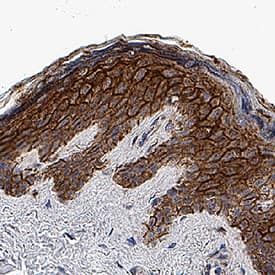Human Desmoglein-1 Antibody
R&D Systems, part of Bio-Techne | Catalog # MAB9441

Key Product Details
Species Reactivity
Applications
Label
Antibody Source
Product Specifications
Immunogen
Glu50-His545
Accession # Q02413
Specificity
Clonality
Host
Isotype
Scientific Data Images for Human Desmoglein-1 Antibody
Desmoglein-1 in Human Skin.
Desmoglein-1 was detected in immersion fixed paraffin-embedded sections of human skin using Mouse Anti-Human Desmoglein-1 Monoclonal Antibody (Catalog # MAB9441) at 5 µg/mL for 1 hour at room temperature followed by incubation with the Anti-Mouse IgG VisUCyte™ HRP Polymer Antibody (VC001). Before incubation with the primary antibody, tissue was subjected to heat-induced epitope retrieval using Antigen Retrieval Reagent-Basic (CTS013). Tissue was stained using DAB (brown) and counterstained with hematoxylin (blue). Specific staining was localized to cytoplasm cell surface. Staining was performed using our protocol for IHC Staining with VisUCyte HRP Polymer Detection Reagents.Applications for Human Desmoglein-1 Antibody
Immunohistochemistry
Sample: Immersion fixed paraffin-embedded sections of human skin
Formulation, Preparation, and Storage
Purification
Reconstitution
Formulation
Shipping
Stability & Storage
- 12 months from date of receipt, -20 to -70 °C as supplied.
- 1 month, 2 to 8 °C under sterile conditions after reconstitution.
- 6 months, -20 to -70 °C under sterile conditions after reconstitution.
Background: Desmoglein-1
Desmoglein-1 is one of three members of the desmoglein subfamily of calcium-dependent cadherin cell adhesion molecules. Together with desmocollins, another subfamily within the cadherin superfamily, the desmoglein isoforms form the adhesive components of desmosomes, the cell-cell adhesive structures that are found in epithelial cells. Human Desmoglein-1 is a type I transmembrane glycoprotein of 1049 amino acid (aa) residues with a 23 aa signal peptide and a 26 aa propeptide. It differs from other classic cadherins by having four instead of five cadherin repeat domains in its extracellular region, and a much larger cytoplasmic region containing five desmoglein repeat domains which share homology with the cadherin repeats. Instead of having the HAV adhesion motif found in type I cadherins, Desmoglein-1 has R/YAL as the adhesion motif on its amino-terminal cadherin repeat. The cytoplasmic tail of Desmoglein-1 interacts with desmoplakins, plakoglobin and plakophilins. In turn, these proteins link the Desmoglein-1 with the intermediate filaments. Desmoglein-1 has been shown to be important in establishing cell-cell adhesion and function in the epidermis. In the autoimmune skin disease pemphigus foliaceus, autoantibodies to Desmoglein-1 can cause the loss of keratinocyte adhesion resulting in blisters.
References
- Nollet, R. et al. (2000) J. Mol. Biol. 299:551.
- Elias, P. et al. (2001) J. Cell Biol. 153:243.
Alternate Names
Entrez Gene IDs
Gene Symbol
UniProt
Additional Desmoglein-1 Products
Product Documents for Human Desmoglein-1 Antibody
Product Specific Notices for Human Desmoglein-1 Antibody
For research use only
